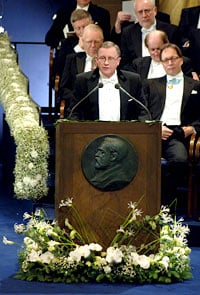Award ceremony speech
Presentation Speech by Professor Staffan Normark, Member of the Nobel Assembly at Karolinska Institutet, December 10, 2005.
 |
| Professor Staffan Normark delivering the Presentation Speech for the 2005 Nobel Prize in Physiology or Medicine at the Stockholm Concert Hall. Copyright © Nobel Media AB 2005 Photo: Hans Mehlin |
Your Majesties, Your Royal Highnesses, Ladies and Gentlemen
Napoleon Bonaparte was not poisoned, but died of a stomach ulcer that had been transformed into cancer. Author James Joyce, still disappointed at the poor reception of his latest novel Finnegans Wake, died of a perforated ulcer. Ulcers don’t strike only the famous. They are one of the most common afflictions of humanity. For a long time, ulcers were regarded as being a result of stress and improper diet. Barry Marshall’s and Robin Warren’s discovery that ulcers are caused by a bacterial infection was therefore completely revolutionary and was initially met by great skepticism.
Robin Warren, in his professional role as a clinical pathologist, observed spiral-shaped bacteria in tissue specimens from the stomachs of many patients who had undergone gastroscopy. These bacteria were abundantly present, associated with the epithelium of the stomach and shielded from dangerous hydrochloric acid by a thick mucous layer. Warren saw that the underlying mucous membrane always showed signs of inflammation and therefore suggested that the spiral-shaped bacteria caused gastritis.
Barry Marshall became interested in Warren’s findings and decided to culture the bacterium. Many fruitless attempts were made. During the Easter 1982 holiday, the agar plates were left in the incubator by mistake, and when they were inspected after the holiday they contained numerous colonies consisting of the same bacterium that Warren had observed under his microscope. Soon it became clear that a whole new bacterial genus had been isolated. It was eventually named Helicobacter pylori.
Marshall and Warren now conducted a large clinical study, which showed that Helicobacter pylori was found in the stomach of most patients with ulcers either in the duodenum or the stomach and that the bacterium was always associated with inflammation of the mucous membrane.
In order to prove that the bacterium that had been isolated caused a disease, Marshall tried to fulfill Koch’s Fourth Postulate. This implies that an infectious agent that has been isolated must cause the same disease in an experimental animal as in humans. In the absence of a suitable animal model, Marshall decided to drink a bacterial culture containing Helicobacter and he suffered a severe inflammation of the stomach.
Before the connection between Helicobacter infection and ulcer had become clear, the disease was often chronic with frequent relapses. Marshall and Warren were among the first to show that ulcer patients can be cured for good if the Helicobacter is eliminated from the stomach with the help of antibiotics.
Today we know that most ulcers are caused by Helicobacter infection. A chronic infection that involves the entire stomach also increases the risk of stomach cancer, the second most common of all forms of cancer. People are infected in their early childhood years and then carry the infection throughout their life. Half of humanity is infected, but luckily most people have no symptoms of the infection. Helicobacter pylori lives only in the human stomach. From the standpoint of both the bacterium and its human host, ulcer disease, cancer and death are to be regarded as a failure in an otherwise long and relatively harmonious relationship.
Barry Marshall and Robin Warren,
Against prevailing dogmas, you discovered that one of the most common and important diseases of mankind, peptic ulcer disease, is caused by a bacterial infection of the stomach. Your discovery has meant that this frequently chronic and disabling condition can now be permanently cured by antibiotics to the benefit of millions of patients. Your pioneering work has also stimulated research all around the world to better understand the link between chronic infections and diseases such as cancer. On behalf of the Nobel Assembly at Karolinska Institutet, I wish to convey to you our warmest congratulations, and I now ask you to step forward to receive the Nobel Prize from the hands of His Majesty the King.
Nobel Prizes and laureates
Six prizes were awarded for achievements that have conferred the greatest benefit to humankind. The 14 laureates' work and discoveries range from quantum tunnelling to promoting democratic rights.
See them all presented here.
